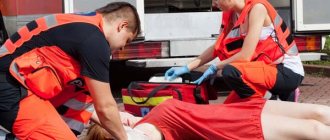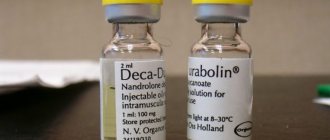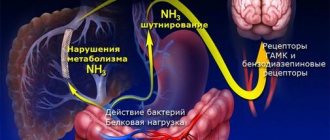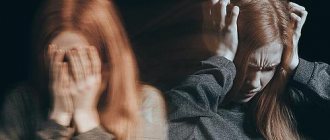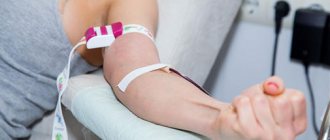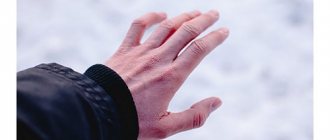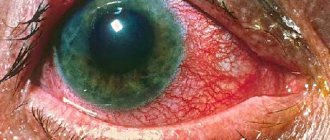The manifestations of the new coronavirus infection are so diverse that despite numerous studies and analysis of millions of clinical cases, it is impossible to identify any reliable symptomatic criteria that would unambiguously confirm infection with COVID-19. Thus, it was previously believed that a clear sign of SARS-CoV-2 was the loss of smell and taste, but reports are increasingly being published about the presence of antibodies to the virus in people who have never complained of such unpleasant sensations. In contrast to external manifestations, the pathogenetic mechanisms of the development of the virus are more clear; there is no longer any doubt that covid affects not only the respiratory tract, but also the central nervous system. But this causes not only numerous neurological symptoms, but also mental disorders. Psychomotor agitation during coronavirus is one of the fairly common complications that must be stopped as quickly as possible to prevent the progression of the disorder. Doctors at the Leto clinic offer advisory assistance in selecting treatment tactics and accompanying the patient after recovery and discharge from a specialized hospital.
How coronavirus affects the brain and psyche
According to clinical studies, approximately a third of patients with coronavirus infection who require hospitalization develop a state of psychomotor agitation , and in the case of severe disease, this figure increases to 70%, regardless of gender and age.
The most common clinical manifestation of Covid is acute respiratory distress syndrome (rapidly developing massive inflammation of the lungs), which is presumably associated with subsequent impairment of cognitive functions. Respiratory failure leads to deterioration of blood supply to the brain, hypoxia, and deficiency of essential nutrients, which generally affects nervous and mental activity.
The following factors also play a certain role in the development of psychomotor agitation during coronavirus:
- increase in body temperature to febrile levels;
- systemic intoxication, which is caused by severe infection on the one hand, and the use of high doses of drugs on the other;
- severe metabolic disorders, deterioration of the filtration function of the kidneys and liver;
- systemic inflammatory process;
- pathological “response” of the immune system in the form of a cytokine storm.
In addition, SARS-CoV-2 has a direct damaging effect on cells of the central and possibly peripheral nervous system. It is this phenomenon that underlies the loss of olfactory and taste sensitivity, which in many patients persists for several weeks (and sometimes months) after Covid.
Information obtained from studying coronaviruses even before the emergence of the SARS-CoV-2 subtype indicates that the accumulation of the pathogen in tissues provokes uncontrolled inflammatory changes in the brain. In this case, the process primarily affects astrocytes - cells that determine the development and metabolic parameters of neurons. In addition, severe inflammation leads to increased permeability of the blood-brain barrier to toxins.
It has also been established that coronavirus infection is characterized by damage to the hippocampus, which is responsible for basic cognitive functions. This explains the long-term consequences of psychomotor agitation during coronavirus described in clinical observations.
Possible risk factors
Experts call the following triggers:
- the need for hospital stay;
- forced social isolation;
- well-founded worries about a successful outcome of the disease, fear of complications and death;
- already existing neurological pathologies: complications after head injuries, stroke, tumors, epilepsy, congenital malformations, etc.
Since the disorder usually occurs in patients predisposed to severe coronavirus infection. According to one hypothesis, older people are prone to this disorder, especially those suffering from dementia, patients with underlying cardiovascular and respiratory pathologies, diabetes, and obesity. It is assumed that the likelihood of psychotic complications is higher with concomitant psycho-emotional disorders. But as of the end of 2022, there are no statistics to support these theories.
Reasons for deviations
Psychomotor agitation can be an acute reaction to a stressful situation that occurs in a mentally healthy person who finds himself in an extreme situation. It develops immediately after mental trauma or a life-threatening condition.
Often a person develops motor restlessness, after which he falls into a stupor.
In addition, the disorder may be a consequence of the following conditions:
- Acute infectious pathologies . They are accompanied by intoxication damage to the nervous system as a result of exposure to viruses or bacteria.
- Traumatic brain injuries . Also, psychomotor agitation can be a consequence of other brain lesions.
- Acute and chronic intoxication of the body . Poisoning with quinine, caffeine, and atropine can lead to them. Also included in this category is delirium delirium.
- Epilepsy.
- Hysteria . This condition may be a reaction of the body to external factors.
- Hypoxia and toxic brain damage . This condition can be observed in precomatous and comatose cases.
- Psychical deviations . This category includes depressive psychosis, manic agitation, and schizophrenia. Bipolar affective disorder can also lead to psychomotor agitation.
- Delirium . This term refers to clouding of consciousness, which is accompanied by figurative delusions, visual hallucinations, and a feeling of fear.
Clinical signs of the syndrome
The picture of psychomotor agitation during coronavirus is in many ways reminiscent of the state of acute delirium. This is not just usually excitement, fear or anxiety - with this disorder the patient completely loses control over his behavior and emotions.
In addition to aimless but irrepressible physical activity, the following symptoms are noted:
- Denial of one's own illness. The person does not allow doctors to see him, tries to remove IVs, medical equipment, etc. He is convinced that he is healthy and there is no need to stay in the hospital.
- Attacks of aggression and irritability, in severe cases - attempts at physical violence towards both loved ones and doctors or complete strangers.
- Mistrust and suspicion. The patient questions and criticizes doctors’ prescriptions, tries to refute professional opinion, resorting to various publications on the Internet and the experience of friends. Sometimes, against the background of such a delirious syndrome, an obsessive delusion of persecution is formed, in which the patient has thoughts that his loved ones want to “lime” him, “destroy him”, etc. He suspects that the results of his tests are deliberately distorted, and explains his poor health by the fact that they allegedly injected him with poison on purpose.
A person is unable to stay in one place and constantly strives to run somewhere, not taking into account the possible consequences. Facial expressions are hypertrophied, speech is very loud, but “crumpled” - the patient cannot concentrate on anything, is easily distracted even by minor stimuli (noise on the street or in the corridor, bright light, etc.), does not understand requests addressed to him and questions.
Sometimes an attack of acute psychomotor agitation is replaced by a reverse reaction - a slowdown in movements, mental and intellectual activity. The patient does not want to move, remains in one position for a long time, and practically does not react to what is happening around him. Total apathy develops. The person is not at all interested in what to do next, he is indifferent to the outcome of treatment, his own condition, and sometimes refuses to eat, which is an indication for starting parenteral nutrition.
The essence of the disease
Psychomotor agitation is a mental disorder that is accompanied by increased motor activity.
This condition is provoked by various pathologies. Depending on this, there are quite a few types of psychomotor agitation. This condition is accompanied by increased anxiety, irritability, feelings of anger or confusion. Sometimes patients show aggression or behave completely inappropriately.
The duration of excitation can vary - from an hour to a week. The severity of the manifestations of this condition is influenced by the underlying pathology.
Cost of services
| CONSULTATIONS OF SPECIALISTS | |
| Initial consultation with a psychiatrist (60 min.) | 6,000 rub. |
| Repeated consultation | 5,000 rub. |
| Consultation with a psychiatrist-narcologist (60 min.) | 5,000 rub. |
| Consultation with a psychologist | 3,500 rub. |
| Consultation with Gromova E.V. (50 minutes) | 12,000 rub. |
| PSYCHOTHERAPY | |
| Psychotherapy (session) | 7,000 rub. |
| Psychotherapy (5 sessions) | 30,000 rub. |
| Psychotherapy (10 sessions) | 60,000 rub. |
| Group psychotherapy (3-7 people) | 3,500 rub. |
| Psychotherapy session with E.V. Gromova (50 minutes) | 12,000 rub. |
This list does not contain all prices for services provided by our clinic. The full price list can be found on the “Prices” , or by calling: 8(969)060-93-93. Initial consultation is FREE!
Questions and answers on the topic “Nervous excitement”
Question: For several months now I have had constant increased nervous excitability. I get nervous with or without reason, and now I’m already nervous from the very fear of starting to get nervous. On the EEG: moderately pronounced general changes in bioelectrical activity. Signs of irritation of brain stem structures. How likely can we talk about organic brain damage here?
Answer: Carrying out an instrumental examination without indications and an overdiagnostic coven in the description of examination data is the path to the somatization of mental disorders and the neuroticization of the nation. General rule: EEG is needed to diagnose epilepsy. Exceptions to this rule are extremely rare. An example of an exception is suspected brain death.
Principles of treatment
If an attack of psychomotor agitation during coronavirus began in a hospital, antipsychotic drugs and tranquilizers are used. Their dose is selected very carefully to avoid possible adverse reactions. At the same time, treatment of COVID-19 continues according to the previously determined scheme. Constant monitoring of vital functions (saturation, heart rate, pressure, ECG pattern, etc.) and laboratory parameters is required (in particular, special attention is paid to the level of the main marker of the intensity of the inflammatory process - C-reactive protein).
How to help at home
If characteristic symptoms appear during outpatient treatment of coronavirus, you should first call an ambulance. It is imperative to report confirmed or suspected Covid (occasionally COVID-19 begins with psychotic disorders).
Under no circumstances should you self-medicate! The only thing that can be done is to protect the person as much as possible. It is necessary to remove breakable objects and interior elements that are easy to injure, and tightly close the entrance and balcony doors and windows.
You can get additional advice on the treatment of psychomotor agitation during coronavirus and the correction of concomitant mental disorders from our operators by phone 8(969)060-93-93.
Health care
After the patient is hospitalized, he is prescribed emergency medication. At this stage, different types of tranquilizers are used, which quickly stop psychomotor agitation.
For this purpose, intravenous use of antipsychotics, which have pronounced sedative properties, is indicated. For example, a doctor may prescribe Levomepromazine at a dosage of 50-75 mg or Clozapine at a dosage of 50 mg.
One of the most effective means for relieving the symptoms of this condition is Aminazine. This drug must be administered intramuscularly. The dosage may vary - it all depends on the height, age and weight of the patient. The range is 25-100 mg. The use of this remedy is supplemented with the same volume of novocaine 0.25-0.5%. Thanks to this, the person quickly calms down and falls asleep.
Reducing the level of arousal should not lead to a decrease in the intensity of therapy or monitoring of the patient. The fact is that the disease can return with renewed vigor. In such a situation, the person will need to be helped again.
If the patient was previously seen by specialists with the same syndrome, its symptoms are relieved using the same drugs. However, in such a situation, double dosage is indicated.
Diagnostics
Relief from psychomotor agitation occurs effectively if the patient receives medical assistance in a timely manner. Treatment should be preceded by an examination of the patient, further diagnosis of the pathological condition, and clarification of the causes of its occurrence.
A clear clinical picture accompanying psychomotor type disorders allows the doctor to reliably classify it. A conversation with the patient’s loved ones or relatives helps to clarify the causes of a dangerous condition, since it is difficult to establish direct contact directly with the patient due to his aggression. The following questions require answers:
- about the patient’s possibility of using alcohol, drugs, medications, and other substances that can cause intoxication of the body;
- about the presence of acute or chronic infections;
- about diagnosed mental pathologies, prescription and use of medications.
